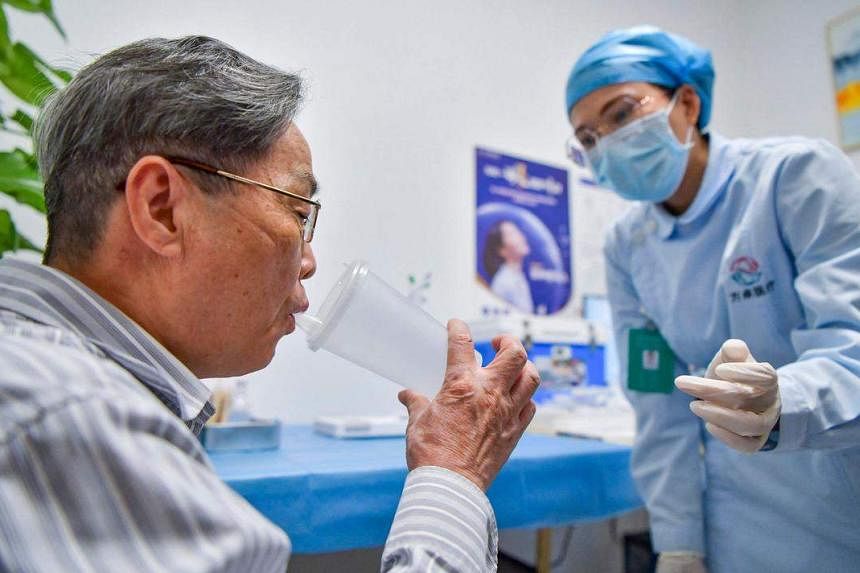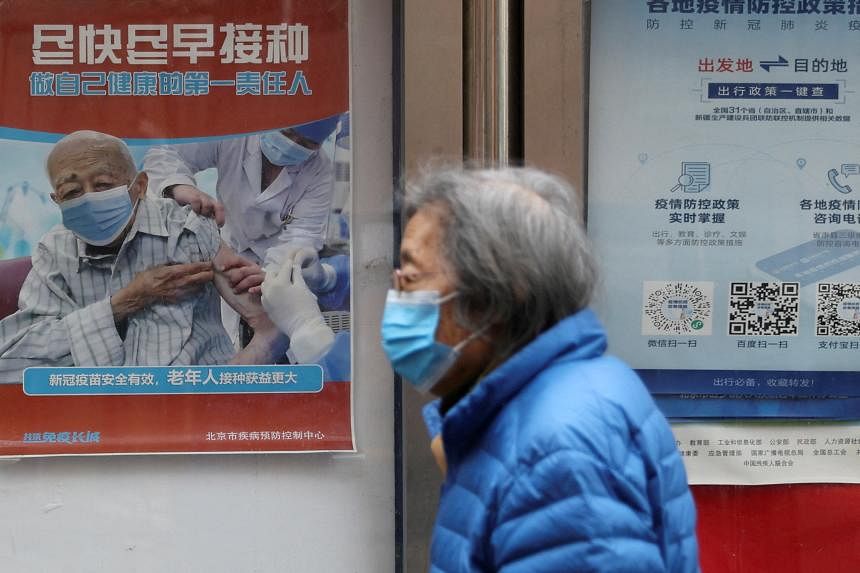BEIJING - As the Chinese health authorities speed up vaccinating the country’s elderly in order to loosen strict Covid-19 curbs that have battered the economy and sparked nationwide protests, they will have a hard time convincing someone like Madam Shao Yulan to take the shot.
The 84-year-old retired civil servant, who lives in Hegang city in the northern Heilongjiang province, is a die-hard hold-out against China’s national vaccination drive.
While the immunisation campaign using domestically produced inactivated vaccines was launched as early as July 2020, Beijing delayed including those aged 60 and over for about nine months, citing lack of data on efficacy and safety for the older set.
By the time it decided to extend the free voluntary jab to senior citizens, China had already controlled the pandemic through its strict but effective protocols of mask-wearing and lockdowns, including shutting its borders.
It also launched a successful propaganda campaign over its Covid-19 management, playing up its low death and infection figures against other countries, especially the United States.
Since the start of the pandemic, it has recorded about 5,000 deaths, while the US has had more than a million.
Madam Shao has hypertension and worries about side effects of the jab. And like many others, she insists there is little chance she will catch the virus because she hardly steps out of her home.
“My son usually buys groceries and my daily necessities for me, and he drives me to visit our relatives occasionally. I have no contact with strangers,” she said.
Since June, her community office has called her twice a month to cajole her to take the vaccine. In September, four community workers including a doctor came knocking with a blood pressure monitor and the vaccine, and took her blood pressure on the spot. It was 210/110 mmHG, considered severe hypertension.
“With my health condition, I guess I will never consider vaccination. I’m willing to support the national policy, but I can’t bet my life on it,” she said.
The authorities are making a renewed push for seniors to be inoculated. While more than 90 per cent of its population of 1.4 billion are fully vaccinated, only 65.8 per cent of people over the age of 80 have completed the full course of jabs, and just 40 per cent have taken booster shots.
Of those aged 60 and above, 86 per cent are fully vaccinated, health officials said at a news conference on Tuesday.
The National Health Commission (NHC) will form a working group to direct efforts to immunise those over the age of 60, including using big data to home in on them, and pushing jabs in nursing homes and activity centres for seniors.
Those who refuse to take the shot will be asked for an explanation, the top health body outlined in a work plan.
China has been held back from reopening by the low vaccination rate among the elderly, the most vulnerable segment of the population. It has said that abandoning its tough zero-Covid-19 policy without preparation would inundate its healthcare system and result in more than a million deaths.
But faced with a wave of protests unseen in years across major cities calling for an end to lockdowns and mass testing, and a resumption of work, the Chinese leadership is under pressure to let go of its iron grip on the disease.
The local authorities, also under pressure to ramp up inoculation numbers, have offered cash or shopping vouchers of between 100 and 500 yuan (S$19 and S$96) to the elderly to entice them to take the jab.
But reports of coercion and even forced vaccination have also surfaced.
A woman in Liaoning complained on the provincial health commission’s website that community workers who came knocking had distracted her aunt and forcibly injected her grandmother with the vaccine. The old woman later developed a fever, and was diagnosed with sepsis.
Another man, whose complaint also appeared on the website, said officials in his village of Yangjiayuan in Liaoning gave his father four jabs, which caused him to develop cerebral thrombosis, a blood clot in the brain. The health commission said these public complaints have been resolved.
Mr Xia Gang, the head of health immunisation at the Chinese Centre for Disease Control and Prevention under the NHC, said its survey of the elderly showed that those unvaccinated are “not sufficiently aware of the risk of infection” and feel protection is unnecessary since they have limited exposure to Covid-19.
There are also those with underlying medical conditions who are concerned about the vaccine’s side effects. For a third group, mobility issues make it inconvenient to receive a vaccine.
The health authorities have attempted to raise awareness that those with underlying diseases are at greater risk of developing severe or critical illnesses if they are infected.
“The elderly have the most to gain from vaccination against the virus,” said Mr Xia in an interview with official news agency Xinhua on Saturday.
More mobile vaccination stations will be set up, while healthcare teams will visit less-mobile seniors at home, he said.

Madam Jiang Yulan, 68, has been determined not to get vaccinated because of her “bad heart” and being “scared of vaccines”.
She, too, has been at the receiving end of constant visits by community workers trying to make her take the jab.
“I said, ‘Do you dare to sign a contract, do you dare to guarantee that there will be no problems? If you dare, I will do it.’ They did not dare to make this promise,” said Madam Jiang from her home in Arun Banner in north-eastern Inner Mongolia, where case numbers are low.
As many as 70 per cent of the elderly in her town are not vaccinated, she said.
The retired party cadre, who was previously director of the All-China Women’s Federation in Arun Banner, admits to feeling guilty for holding back the country’s reopening.
“If there are more cases around me, I will have to get vaccinated immediately. I can’t affect the people around me. Or if the country opens up, then I have to get the vaccine.”


